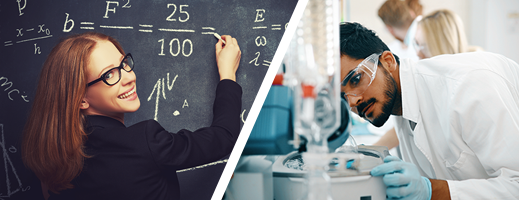Training
The Physics-Chemistry mention starts at the end of the 1st year of License (L1) and concerns the 2nd and 3rd year (L2 and L3):
- The second year (L2 mention Physics-Chemistry) is devoted to a deepening of the basics in physics and chemistry. It also makes it possible to acquire additional knowledge and skills through optional courses of bi-disciplinary interest or of a pre-professional nature.
- The third year (L3 mention Physics-Chemistry) allows the student to acquire knowledge and skills in areas of interest to both physics, chemistry and their interface. The last semester (S6) offers differentiated training according to the student's post-license project: master's degree in physics, master's degree in chemistry or master's MEEF (Teaching, Education and Training professions), school of engineering, working life... The differentiation translates into lessons in physics and/or chemistry useful for the planned master's degree or an internship in a company for the student wishing to integrate professionally at the end of the license.
The validation of the License results in the acquisition of a set of knowledge and skills structured in blocks (BCC).
Use of formal knowledge of the major fields of Physics and Chemistry as well as the use of basic mathematical and computer tools.
Use of tools specific to any autonomous scientific approach.
Set of skills preparing for professional integration.
The knowledge provided by the training covers the fundamental theoretical and practical knowledge of the major fields of physics and chemistry: mechanics, optics, electromagnetism, electronics, thermodynamics, physico-chemistry, physical chemistry, organic chemistry, inorganic chemistry, ...
Among the various skills provided by the training, we can mention:
- Know how to use the most common measuring devices and techniques; know how to choose the appropriate equipment.
- Know how to create a synergy between the knowledge acquired in physics and chemistry.
- Know how to develop and implement independently an experimental approach to deal with a given problem in physics, chemistry or at the interface: design, measurement, analysis, interpretation of experimental data, modelling, ...
- Know how to search, analyze, exploit information; know how to draw up a synthesis; know how to write a report.
- Ability to take initiative; know how to work in a team.
- Ability to speak in public; master English.
